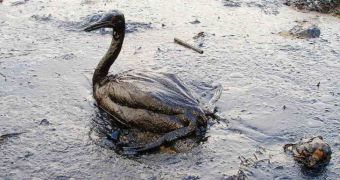Last weekend, a barge collided with a ship in the Houston Ship Channel, and 168,000 gallons of marine shipping oil of a fairly thick consistency spilled into nearby waters. Following this very close encounter between the barge and the ship, authorities were forced to temporarily close this sailing route.
Recent news on the topic says that, due to its consistency and makeup, the oil that leaked into said region of the United States is giving specialists and workers quite a headache.
Thus, the fuel is said to be especially difficult to contain, hence the fact that, just a couple of days after the spill, its presence was reported at a distance of about 12 miles (roughly 19.3 kilometers) from the site where the barge and the ship collided. EcoWatch informs that, according to several experts and wildlife researchers, this oil spill in Texas happened in the worst possible place in Galveston Bay, and at the worst possible time. What they mean is that, all things considered, this incident has high chances to have a major impact on local wildlife.
The same source details that the area affected by the spill is home to many birds belonging to a fairly wide variety of species. These birds are migrating ones, and they travel to the Houston Shipping Channel to nest and raise their young on its banks on a yearly basis.
Since the birds that specialists are now worried about don't actually live in the United States and only visit this country every once in a while, they might have escaped unscathed had the spill occured at another time. However, this is not the case.
On the contrary, the barge spilled some of the marine shipping oil it was transporting into Galveston Bay just as tens of thousands of birds are heading towards this area. This means that, when they reach their destination, the feathered creatures will probably be greeted by a not-so-appealing oil slick.
“We expect this to get much worse,” Jessica Jubin, a spokesperson for the Houston Audubon Society, i.e. the manager of the local Bolivar Flats preserve, told the press in a recent interview. What she meant is that, if experts are right, this spill will continue to have a negative impact on wildlife in the region for years to come.
The good news is that crews are now doing their best to keep the marine shipping fuel from reaching shore and entering bird-nesting habitat. The bad news is that, of the birds that are expected to arrive in the region, nearly all are big fans of fishing. Hence, it could be only a matter of time before they become exposed to oil.
“It’s heavy and sticky and stays on the surface. That’s a bad thing if you’re a bird or any species that comes up through the surfaces like dolphins or turtles,” said Debbie Patton with the United States National Oceanic and Atmospheric Administration.

 14 DAY TRIAL //
14 DAY TRIAL //